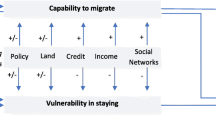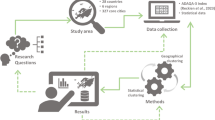Abstract
Purpose of Review
This article reviews existing evidence for a climate-conflict link in Syria and examines how the respective debate reproduces three important shortcomings of climate-conflict research.
Recent Findings
The potential climate-conflict link for Syria can be conceived of as a four-stage process, with various levels of scientific evidence and consensus existing for each stage: (1) climate change inducing the heavy 2006–2009 drought (plausible, but not proven); (2) massive loss of agricultural livelihoods, significantly attributable to the drought (supported by a majority of studies, but contested); (3) massive rural-to-urban migration triggered by livelihood loss in combination with other factors (supported by a majority of studies, but contested); and (4) migration intensifying existing grievances and facilitating the onset of protests and the subsequent civil war (possible, but little knowledge exists).
Summary
The debate about the Syrian case reproduces three important shortcomings of climate-conflict research: limited dialogue between different methods, an overstatement of differences, and a lack of theoretical engagement. These shortcomings also have adverse impacts in terms of policy advice.


Similar content being viewed by others
References
Papers of particular interest, published recently, have been highlighted as: • Of importance •• Of major importance
Friedman TL (2018) The tweet Trump could never send Tehran. www.nytimes.com/2018/01/23/opinion/trump-iran-climate-change.html. Accessed 01/02/2018.
Allansson M, Melander E, Themnér L. Organized violence, 1989-2016. J Peace Res. 2017;54(4):574–87.
Gleick P. Water, drought, climate change, and conflict in Syria. Weather Clim Soc. 2014;6(3):331–40. An early and groundbreaking study claiming a link between climate change and the Syrian civil war.
Werrell CE, Femia F, Sternberg T. Did we see it coming? State fragility, climate vulnerability, and the uprisings in Syria and Egypt. SAIS Rev Int Aff. 2015;35(1):29–46.
de Châtel F. The role of drought and climate change in the Syrian uprising: untangling the triggers of the revolution. Middle East Stud. 2014;50(4):521–35.
Kelley CP, Mohtadib S, Cane MA, Seager R, Kushnir Y. Climate change in the Fertile Crescent and implications of the recent Syrian drought. PNAS. 2015;112(11):3241–6. The article which made the climate-conflict thesis for the case of Syria widely known.
Weinthal E, Zawahri N, Sowers J. Securitizing water, climate, and migration in Israel, Jordan, and Syria. Int Environ Agreements. 2015;15(3):293–307.
Feitelson E, Tubi A. A main driver or an intermediate variable? Climate change, water and security in the Middle East. Glob Environ Chang. 2017;44(1):39–48. The study povides an elaborated theoretical framework, which is used to compare the impacts of the 2006–2009 drought and the potential conflict implications for six Middle Eastern countries.
Fröhlich C. Climate migrants as protestors? Dispelling misconceptions about global environmental change in pre-revolutionary Syria. Contemporary Levant. 2016;1(1):38–50. In-depth, interview-based study on migration-conflict links and the Syrian civil war.
Femia F, Werrell CE. An unstable, stable nation? Climate, water, migration and security in Syria from 2006–2011. In: Sternberg T, editor. Climate hazard crises in Asian societies and environments. London: Routledge; 2017. p. 1–10.
Selby J, Dahi OS, Fröhlich C, Hulme M. Climate change and the Syrian civil war revisited. Polit Geogr. 2017;60(1):232–44. The most convincing critique of studies linking climate change to the civil war in Syria.
Gleick PH. Climate, water, and conflict: a comment on Selby et al. Polit Geogr. 2017;60(1):248–50.
Hendrix CS. A comment on “climate change and the Syrian civil war revisited”. Polit Geogr. 2017;60(1):251–2.
Kelley CP, Mohtadib S, Cane MA, Seager R, Kushnir Y. Commentary on the Syria case: climate as a contributing factor. Polit Geogr. 2017;60(1):245–7.
Selby J, Dahi OS, Fröhlich C, Hulme M. Climate change and the Syrian civil war revisited: a rejoinder. Polit Geogr. 2017;60(1):253–5.
Selby J. Climate change and the Syrian civil war, part II: the Jazira’s agrarian crisis. Geoforum, online ahead of print. 2018;
Müller MF, Yoon J, Gorelick SM, Avisse N, Tilmant A. Impact of the Syrian refugee crisis on land use and transboundary freshwater resources. PNAS. 2016;113(52):14932–7.
Syria:direct. Grain shortages and financial ruin plague Hasakah farmers as crops fail after devastating drought. http://syriadirect.org/news/grain-shortages-and-financial-ruin-plague-hasakah-farmers-as-crops-fail-after-devastating-drought (2018). Accessed 17/07/2018.
Adams C, Ide T, Barnett J, Detges A. Sampling bias in climate-conflict research. Nat Clim Chang. 2018;8(3):200–3.
Flyvbjerg B. Five misunderstanding about case-study research. Qual Inq. 2006;12(2):219–45.
UN-OCHA. Syria drought response plan. New York: UN; 2009.
Cook BI, Anchukaitis KJ, Touchan R, Meko DM, Cook ER. Spatiotemporal drought variability in the Mediterranean over the last 900 years. JGR: Atmospheres. 2016;121(5):2060–74.
Hoerling M, Eischeid J, Perlwitz J, Quan X, Zhang T, Pegion P. On the increased frequency of Mediterranean drought. J Clim. 2012;25(6):2146–61.
Mathbouta S, Lopez-Bustins JA, Martin-Vide J, Bech J, Rodrigo FS. Spatial and temporal analysis of drought variability at several time scales in Syria during 1961–2012. Atmos Res. 2018;200(1):153–68.
IPCC. Climate change 2013: the physical science basis. Cambridge: Cambridge University Press; 2013.
WWA. World weather attribution: analyses. www.worldweatherattribution.org/analyses (2018). Accessed 17/07/2018.
World Bank. Climate change knowledge portal. http://sdwebx.worldbank.org/climateportal/index.cfm?page=country_historical_climate (2016). Accessed 07/03/2018.
Dukhan H. Tribes and tribalism in the Syrian uprising. Syrian Stud. 2014;6(2):1–128.
Eklund L, Thompson D. Differences in resource management affects drought vulnerability across the borders between Iraq, Syria, and Turkey. Ecol Soc. 2017;22(4):1–11.
Ansani A, Vittorio D. About a revolution: the economic motivations of the Arab Spring. Int J Dev Conflict. 2012;2(3):1–24.
Azmeh S. Syria’s passage to conflict: the end of the “developmental rentier fix” and the consolidation of new elite rule. Polit Soc. 2016;44(4):499–523.
Barnett J, Adger WN. Climate change, human security and violent conflict. Polit Geogr. 2007;26(6):639–55.
Benjaminsen T, Alinon K, Buhaug H, Buseth JT. Does climate change drive land-use conflict in the Sahel? J Peace Res. 2012;49(1):97–111.
De Juan A. Long-term environmental change and geographical patterns of violence in Darfur, 2003–2005. Polit Geogr. 2015;45(1):22–33.
Solow AR. A call for peace on climate and conflict. Nature. 2013;497(7448):179–80.
Ide T. Research methods for exploring the links between climate change and conflict. Wiley Interdiscip Rev Clim Chang. 2017;8(3):1–14.
Selby J. Positivist climate conflict research: a critique. Geopolitics. 2014;19(4):829–56.
Verhoeven H. Gardens of Eden or hearts of darkness? The genealogy of discourses on environmental insecurity and climate wars in Africa. Geopolitics. 2014;19(4):784–805.
Gerring J. Case study research: principles and practices. New York: Cambridge University Press; 2007.
Anderson C. Heat and violence. Curr Dir Psychol Sci. 2001;10(1):33–8.
Detges A. Local conditions of drought-related violence in Sub-Saharan Africa: the role of road and water infrastructures. J Peace Res. 2016;53(5):696–710.
Schleussner C-F, Donges JF, Donner RV, Schellnhuber HJ. Armed-conflict risks enhanced by climate-related disasters in ethnically fractionized countries. PNAS. 2016;113(33):9216–21.
von Uexkull N, Croicu M, Fjelde H, Buhaug H. Civil conflict sensitivity to growing-season drought. PNAS. 2016;113(44):12391–6.
Böhmelt T, Bernauer T, Buhaug H, Gleditsch NPG, Tribaldos T, Wischnath G. Demand, supply, and restraint: determinants of domestic water conflict and cooperation. Glob Environ Chang. 2014;29(1):337–48.
Schrodt PA. Seven deadly sins of contemporary quantitative political analysis. J Peace Res. 2013;51(2):287–300.
Abrahams DR, Carr ER. Understanding the connections between climate change and conflict: contributions from geography and political ecology. Curr Clim Chang Rep. 2017;3(4):233–42.
Ide T. Towards a constructivist understanding of socio-environmental conflicts. Civil Wars. 2016;18(1):69–90.
Buhaug H, Nordkvelle J, Bernauer TB, Böhmelt T, Brzoska M, Busby JW, et al. One effect to rule them all? A comment on climate and conflict. Clim Chang. 2014;127(3):391–7.
Hsiang S, Burke M, Miguel E. Quantifying the influence of climate on human conflict. Science. 2013;341(6151):1–14.
Saublet S, Larivière V. Mapping the ‘enviro-security’ field: rivalry and cooperation in the construction of knowledge. European Political Science. 2016. https://doi.org/10.1057/eps.2016.26.
Witsenburg KM, Adano WR. Of rain and raids: violent livestock raiding in Northern Kenya. Civil Wars. 2009;11(4):514–38.
Brown IA. Assessing eco-scarcity as a cause of the outbreak of conflict in Darfur: a remote sensing approach. Int J Remote Sens. 2010;31(10):2513–20.
Schilling J, Opiyo F, Scheffran J. Raiding pastoral livelihoods: motives and effects of violent conflict in north-eastern Kenya. Pastoralism. 2012;2(25):1–16.
UN-OCHA. Syria drought response plan: 2009–2010 mid-term review. New York: UN; 2010.
Ali M. Years of drought: a report on the effects of drought on the Syrian peninsula. Beirut: Heinrich-Böll-Stiftung Middle East; 2010.
Black R, Bennett S, Thomas SM, Beddington JR. Migration as adaptation. Nature. 2011;478(7370):447–9.
Worth, RF. Earth is parched where Syrian farms thrived. www.nytimes.com/2010/10/14/world/middleeast/14syria.html (2010). Accessed 17/07/2018.
Buhaug, H. What do the experts think? https://blogs.prio.org/ClimateAndConflict/2017/12/what-do-the-experts-think (2017). Accessed 17/07/2018.
Landis ST. Temperature seasonality and violent conflict: the inconsistencies of a warming planet. J Peace Res. 2014;51(5):603–18.
Shaffer LJ. An anthropological perspective on the climate change and violence relationship. Curr Clim Chang Rep. 2017;3(4):222–32.
Buhaug H. Climate–conflict research: some reflections on the way forward. Wiley Interdiscip Rev Clim Chang. 2015;6(3):269–75.
Peluso NL, Watts M. Violent environments. In: Peluso NL, Watts M, editors. Violent environments. Ithaca/London: Cornell University Press; 2001. p. 3–38.
Sakaguchi K, Varughese A, Auld G. Climate wars? A systematic review of empirical analyses on the links between climate change and violent conflict. Int Stud Rev. 2017;19(4):622–45.
Gosselin, PL. Spiegel demolishes Syria war-climate change paper by Kelley et al. http://notrickszone.com/2015/03/09/spiegel-demolishes-syria-war-climate-change-paper-by-kelley-et-al-hardly-tenable-distraction-from-real-problems (2015). Accessed 17/07/2018.
Kalte Sonne. Deutsches Klimakonsortium pfeift Rahmstorf zurück: Klimawandel ist nur ein Treiber von vielen im Syrienkonflikt. http://diekaltesonne.de/deutsches-klimakonsortium-pfeift-rahmstorf-zuruck-klimawandel-ist-nur-ein-treiber-von-vielen-im-syrienkonflikt (2016). Accessed 17/07/2018.
Author information
Authors and Affiliations
Corresponding author
Ethics declarations
Conflict of Interest
The author states that there is no conflict of interest.
Additional information
This article is part of the Topical Collection on Climate Change and Conflicts
Rights and permissions
About this article
Cite this article
Ide, T. Climate War in the Middle East? Drought, the Syrian Civil War and the State of Climate-Conflict Research. Curr Clim Change Rep 4, 347–354 (2018). https://doi.org/10.1007/s40641-018-0115-0
Published:
Issue Date:
DOI: https://doi.org/10.1007/s40641-018-0115-0




